Hotel Mapping Dilemma: Inhouse vs. Outsource, Which Is Ideal for Your Travel Business?

Establishing a travel business is a monumental task. From financial planning, developing a website to creating business partnerships, a travel business requires a great amount of resources, energy and finance. To stay afloat in the competitive marketplace, it is important to invest in the right technology for your business. While travel companies invest in administrative software, marketing software, revenue software, etc., hotel mapping technology is the most overlooked factor for a successful business. Hotel mapping is a process of aggregating hotel properties from multiple sources to avoid duplicate and inconsistent listings. Duplicate or inconsistent hotel data arises when OTAs or travel businesses opt for multiple channels such as suppliers, wholesalers, bed banks, GDS, etc. In the current ecosystem, various travel businesses that sell accommodation either opt for an in-house hotel mapping team or outsource. Having an in-house team gives you better control of your business decisions, communication is smooth, sensitive business information is secure within the team. However, insourcing has a fair share of drawbacks with it, such as: 1. Lack of mapping expertise 2. High cost of maintaining a mapping platform 3. Delay in onboarding new source or supplier 4. Slow time-to-market 5. Lack of good quality data Why Travel Businesses Must Outsource Hotel Mapping? Outsourcing uses external specialists to perform specific tasks that the company doesn’t have the availability or budget to do in-house. These tasks, such as hotel mapping and room mapping, are time-consuming or tedious and the goal is to free up your resources to focus on more revenue-generating tasks. If you are wondering if outsourcing is only for big players in the market, then it is not so. Technology has transformed the travel ecosystem and made outsourcing accessible to small and mid-size businesses. According to a recent Deloitte study, the primary reason why organizations outsource is to improve process efficiency and standardization, followed by cost reduction and business value. Post-Covid, companies now want to focus on enhancing their existing offerings and value outsourcing specialists to help them. Another major factor for outsourcing work is to elevate the way they do business and enhance their overall speed to market. Some of the pros of outsourcing hotel mapping services are: Economical Access to mapping specialist Faster time to market Brand loyalty Untap new foreign markets 1. Economical One of the major reasons for outsourcing any service is cost savings. When you outsource a mapping provider, you eliminate the cost of hiring new employees. A benefit that’s mostly overlooked is outsourcing eliminates employee turnover costs, medical insurance compensation, holidays, etc. Outsourcing indirectly helps your business grow steadily and ensures your core team is focused on revenue-generating tasks. 2. Access to mapping specialist When you outsource a mapping service, you collaborate and have access to a talented pool of experts without any geographical limitations. An outsourced hotel mapping provider that works with a diverse set of customers guarantees a high level of expertise that’s needed in their product offerings. Whereas, with an in-house team, you are limited by talent. Research revealed that 78% of businesses worldwide feel positive about their outsourcing partners. When you work with a mapping specialist, you stay ahead of your competitors and you can continue delivering the best customer satisfaction. 3. Faster time to market The key to successful product development is quickly getting a quality product to the market. By outsourcing, you have dedicated resources well-equipped to complete tasks at the utmost speed. This will help you launch new products ahead of your competitors and even boost innovation productivity. Infact, external collaboration with a technology company increases your R&D efforts and product innovation. 4. Brand loyalty It can be a financial strain and time-consuming for travel businesses to put together industry-leading mapping support employees. But with an outsourced mapping provider, you can gain the most refined product that will give your customers the type of service they will keep coming back to. This will enhance your brand loyalty and give you an edge over your competitors. 5. Untap new foreign markets To continue having a strong foothold in the travel industry, companies need ways to establish their presence way before their competitors. When you outsource a mapping provider, you get immediate access to their extensive database data insights, which will help you launch your products in a new market with ease. Clearing the Dilemma of Insourcing Vs. Outsourcing Hotel Mapping As a decision-maker, it is important to ask yourself- Can your in-house team achieve what a team of mapping specialists can? If yes, then you are working in the right direction; if not, then it is best to outsource. We suggest investing in mapping experts who understand your challenges and business. It would be best to opt for credible mapping experts with a proven track record of industry and technical expertise. Also, it is essential to select the mapping vendor that offers you the highest level of mapping quality. This will help you deliver the utmost booking experience to your customers. Furthermore, it is important to communicate clearly with your outsourcing partner to meet all deadlines on time, and you and your partner are on the same page. To maintain steady growth and productivity, we suggest finding an ideal balance with a mix of in-house employees focused on core business activities and outsourced resources for niche technology such as hotel mapping. Outsourcing a hotel mapping provider has a lot of potential- from access to the experts to brand loyalty- and businesses of all sizes can definitely invest in outsourcing hotel mapping and notice how quickly their business flourishes.
Is Google the New Online Travel Agency for Travelers?
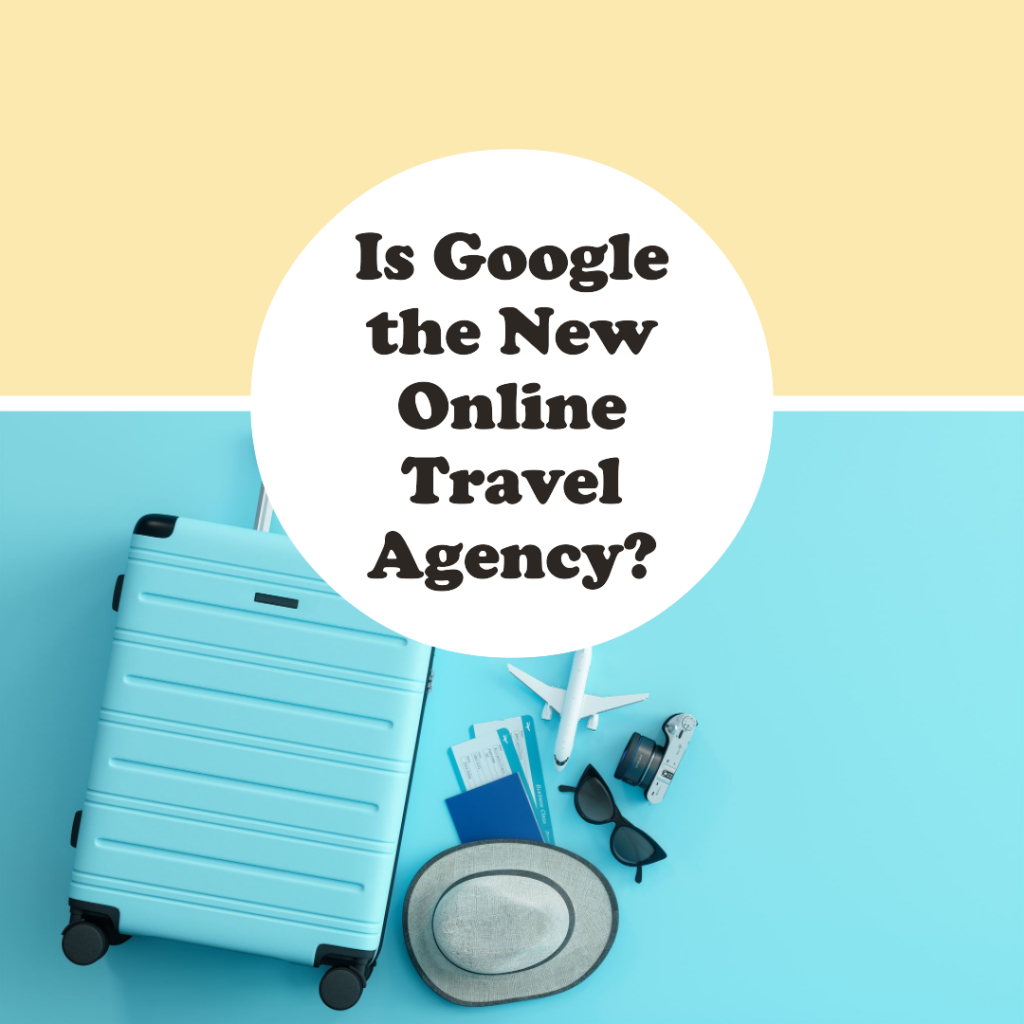
Before the advent of the internet, vacation trips were basically planned by travel agents. The traveler would have to flip through travel brochures, talk to an expert travel agent for affordable hotel rates and discounts and the travel agent would offer a gleaming holiday package at a discounted rate. Fast forward to the 1990s and early 2000s, the world witnessed the boom of online travel agencies like Expedia, Booking.com, and TripAdvisor which helped consumers buy travel products online. The online travel shopping experience turned out to be a megahit and everyone wanted a share in this lucrative business market. The OTA market quickly proliferated with several new companies with unique business models. Noticing the skyrocketing success of OTAs, Google, the search powerhouse, dipped its toes into the online travel market in the early 2010s. The company acquired ITA Software, a Cambridge flight information software company, for $700 million to help users find better flight information. Since then, Google has launched several travel-related products, such as Google Flights, Google Hotel Search, Google Hotel Ads, and a vacation-rental metasearch platform for smarter travel planning. So does Google plan to enter the OTA market in the coming years? Let’s decode that in the following sections. Clearly, Google has been trying to disrupt the online travel agency model, which is currently ruled by Booking.com, Expedia, and TripAdvisor. According to a Hootsuite study, Google controls 92.58% of the global search engine market, helping the digital consumer in the five phases of their journey- dreaming, planning, booking, experiencing, and sharing. While the search engine is not an OTA yet, it clearly is edging in that direction by making search relevant, easy, and quick for travel planners. Let’s understand this with an example. If you do a hotel search on Google, let’s say, Warwick Allerton, Chicago, you will see various options to book the hotel- both from the hotel and OTAs. Here, Google tags the hotel as an official site, so that travel shoppers can directly book from their website instead of choosing an OTA. So, Google here works as an intermediary and not an OTA. So, what’s the threat? OTAs are the preferred booking channel, and with the easy Google Hotel Search, there’s a risk of losing their position. Especially when the metasearch platform delivers a better user experience by making users stay on the same page for research, comparison and booking hotels, this makes it even tougher for OTAs to generate traffic to their website. While these booking platforms will not shut down, their value might scale down. Booking channels like Expedia, Booking.com, TripAdvisor pay billions of dollars for ads to appear at the top of search results. Users are more likely to click the first result, driving more traffic to the website. Basically, OTAs heavily rely on Google for traffic. This traffic comes in the form of paid ads at the top of the page, and ironically, this is similar to how independent hotels rely upon OTAs to display their properties during the search. In fact, Google is a crucial piece of any OTA’s advertising budget because so many travelers search for trips with terms like “flights to London” or “hotels in Chicago.” While OTAs have expressed their interest in reducing their dependence on Google for website traffic, they can’t get away from the fact that it’s their paid ads on Google that drives maximum traffic. According to ResearchAndMarkets.com’s case study, Expedia garnered 1 million more visits from paid marketing with Google in March 2021 than it did in March 2019. So what do we understand of Google’s stand to become an OTA? Google has to just add a feature Book Online and it is a step away from becoming an OTA. But Google doesn’t want to become an OTA and deal with inventory onboarding, hotel contracts, customer support, etc., because that doesn’t align with the company’s business goals. Google was to become the comprehensive search engine for the travel industry. It wants to give travel shoppers complete access to hotels, vacation rentals, and other travel products and capitalize on it. While it will continue to benefit from the paid ads, and organic search, it can be an intensively competitive area for all booking channels. However, it will be interesting to see if Google will continue to be the largest player in the travel market when social platforms like TikTok are giving tough competition to it through its visual travel discovery. Vervotech is a leading Hotel Mapping and Room Mapping API that leverages the power of AI and ML to quickly and accurately identify each property listing through the verification of multiple parameters. With One of the industry’s best coverage of 98% and an accuracy of 99.999%, Vervotech is quickly becoming the mapping software of choice for all leading global companies operating in the travel and hospitality industry. To learn more about Vervotech and the ways it can enhance your business in the long run contact us: sales@vervotech.com
Travel APIs: A 101 guide for travel businesses
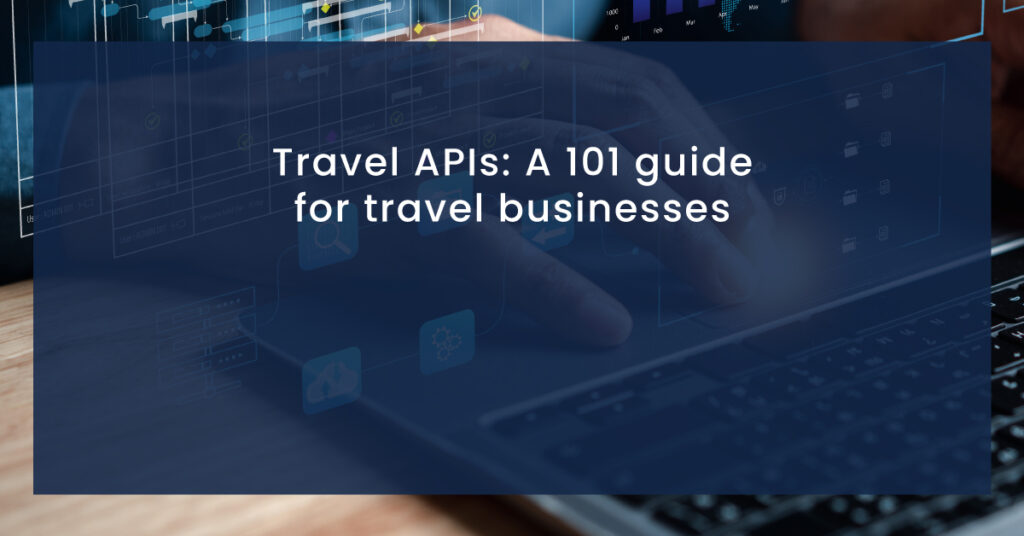
At online marketplaces, travelers prefer to find all travel products on a single platform. A platform that fulfills all their travel needs, from airport transfers, flights, and hotels to homestays. So, it’s a requisite for travel businesses to bring all the travel products on their platform. The stakes are high because a basic human instinct of the human being to window shop, on average, leads them to at least 4 travel websites. That’s why having enough travel products on the forum is a must, and it’s a no-brainer investment. To offer these diverse travel products, travel businesses require data from multiple inventory sources. That’s when the role of Travel APIs comes into play. Over the last decade, travel API integrations have entirely transformed how travel businesses consume travel content from various suppliers and serve an integrated platform to their customers, where they can find all travel products at single shop. The API revolution has made online travel agencies open and comfortable sharing data with third parties. It’s also because APIs offer greater control over data, and the trade happens in a secure and legitimate environment. And obviously, the benefits are immense. Travel APIs, or Application Programming Interfaces, are like online tools that help travel websites and apps communicate with different travel providers, like airlines, hotels, and rental car companies. Think of it this way: imagine a traveler is planning a trip and wants to book a flight, a hotel, and rent a car. Normally, they have to go to each company’s website, look for availability, compare prices, and make separate bookings for each product. But with travel APIs, the website or app can access information from multiple travel providers at once, making it easier for visitors to compare options and make a decision. The travel API acts like a “middleman,” sending requests for information to the various travel providers and then collecting and organizing the data it gets back. This helps travel websites and apps provide users with up-to-date information, such as flight schedules, pricing, and availability, all in one place. In simple terms, travel APIs make it possible for travel websites and apps to do all the hard work of finding and organizing travel information so that travelers can easily plan their trips. As we briefly touched upon earlier, Travel APIs are software intermediaries that allow travel websites, apps, and systems to access functionalities and data from multiple travel providers (such as airlines, hotels, car rental companies, etc.). These APIs enable travel companies to integrate various travel services into their platforms, streamline their operations, and offer a seamless experience to their customers. The major travel APIs include: Flight APIs The flight APIs provide access to flight information, such as schedules, prices, seat availability, and booking. Travel companies can use these APIs to build their own flight booking systems or display flight information on their websites. Hotel APIs Hotel APIs provide access to hotel information, such as room availability, rates, and booking. Travel companies can use these APIs to build their own hotel booking systems or display hotel information on their websites. Car rental APIs These APIs provide access to car rental information, such as availability, rates, and booking. Travel companies can use these APIs to build their own car rental systems or display car rental information on their websites. Destination APIs: The Destinations APIs provide information about destinations, such as weather, local attractions, and events. Travel companies can use these APIs to build their own destination guides or provide destination information on their websites. Payment APIs These APIs provide access to payment systems, allowing travel companies to process payments for travel bookings made on their platforms. Hotel and Room Mapping APIs These APIs remove duplicate and inconsistent hotel listings from travel portals and standardize hotel and room content for travel businesses to ensure their customers get unique and detailed hotel and room information. These APIs work by connecting travel companies to the systems of travel providers or wholesalers and allowing them to access and retrieve data. However, in this transmission of data between travel companies and wholesalers, a lot of inconsistencies also emerge, which lead to dissemination of duplicate and incorrect data, that’s when mapping APIs like Vervotech help in big way in keeping check on these regular inconsistencies in travel data. To sum up, when a customer makes a travel request on a travel company’s website or app, these APIs are used to retrieve the information and make the booking with the relevant travel provider. The APIs then communicate the booking details back to the travel company’s platform, completing the transaction. Recommended: Travel APIs: Flight, fare, rental, and public transport and the top vendors Travel APIs are a crucial component for travel businesses in the digital age. These APIs act as intermediaries between travel businesses and travel providers, allowing the former to access and retrieve information about flights, hotels, car rentals, destinations, payments, and more. By integrating travel APIs into their platforms, travel businesses can provide a seamless, one-stop-shop experience to their customers, streamlining their operations and increasing customer satisfaction. From flight APIs to hotel and room mapping APIs, travel APIs are the key to providing a comprehensive travel solution to customers, making travel easier and more accessible. Vervotech is a leading Hotel Mapping and Room Mapping API that leverages the power of AI and ML to quickly and accurately identify each property listing through the verification of multiple parameters. With One of the industry’s best coverage of 98% and an accuracy of 99.999%, Vervotech is quickly becoming the mapping software of choice for all leading global companies operating in the travel and hospitality industry. To learn more about Vervotech and the ways it can enhance your business in the long run contact us: sales@vervotech.com
Vacation rental software: Five key features to consider
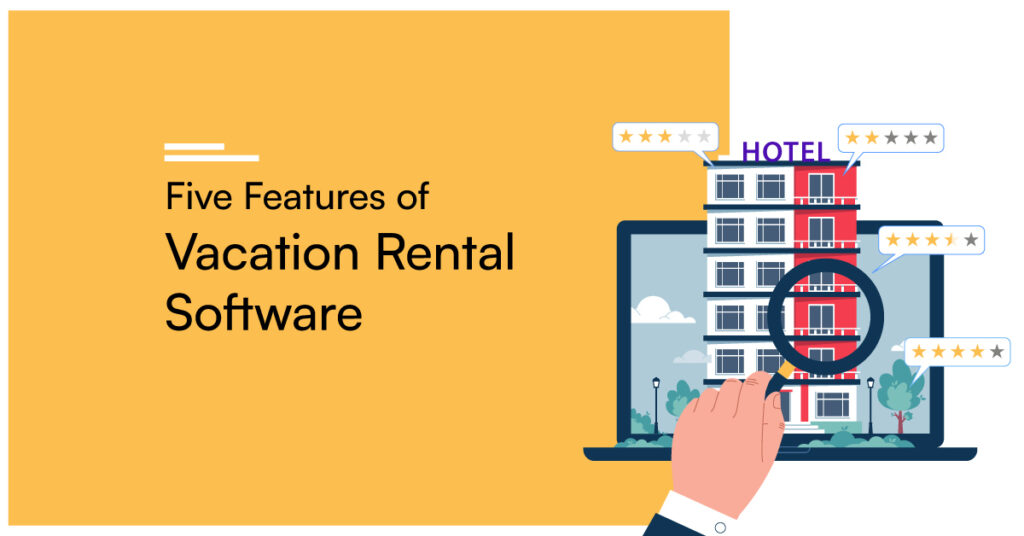
For the majority of travelers, hotels are still the preferred choice of stay. But with time, dynamics are changing. Now people are seriously considering alternative accommodations. A booking.com survey cites that as many as 40 percent of people booked alternative accommodation in the surveyed quarter of 2020. Another travel major Expedia also published a steep rise in vacation rentals. Alternative accommodations are giving tough competition to conventional hotels by offering a home-like environment to business as well as leisure travelers. However, from the supply side, managing alternative accommodation is trickier than conventional hotels. You need efficient vacation rental software that supports the smooth integration of APIs. As accommodation rental offerings are relatively new for the travel market, making a choice on software that manages these could be challenging. So here in this post, we will expound on what vacation rentals are – what they offer and extend suggestions on features that you should look for before signing up with one. What does a vacation rental software do? Vacation rental software or vacation rental property management software enables you to administer and process reservations for short-term rental properties. The functioning of vacation rental software is not much different from a hotel property management system. With vacation rental software, you can easily sync all your properties and accounts in real time. Whether you are a multi-property manager who lists properties on multiple online travel agencies or someone who sells select housing properties on select alternative accommodation portals, you need a centrally managed system that communicates with guests and manages reservations and payments in real-time. A vacation rental software does all this for you with minimal human intervention. To get a better understanding of this tool. And to be in a position where you can take a call on this software, you must dig into features. Five key features of vacation rental software Typically, the modules and functionalities you get from a vacation rental property management system would vary from provider to provider. But there are some modules that are nonnegotiable for every vacation rental management system, following is the breakdown of same. Website Builder Your website forms the base of your brand and marketing efforts, and a website builder makes your job easier by enabling low code website building. That’s why it’s one of the core features of a vacation property management system. If you are a starter, then it becomes even more crucial; you need a launchpad; that’s when these template-based website builders come in handy. You can select a template that aligns with your niche and build your website from there. Reservation Management System Irrespective of the number of properties you manage, you need a reservation management system in your vacation rental software. It’s a prerequisite because it allows you to manage the core functions of your business, which are approve/disapprove bookings, blocking calendars, creating custom quotations, and, more importantly, the data it provides for analyzing these functions. Channel Manager It’s an extremely specific feature; when it comes to vacation rental software, not many tools will have it, but it’s crucial for your business. The channel manager lets you integrate third-party listings and all other data into your calendar. You certainly don’t want a situation where a customer books a room on your platform and, at the time checking in, finds out someone else also has the booking for the same room from another vendor. It’s an embarrassing situation; the channel manager reduces that risk. Pro Tip: To eliminate the risk completely, use a room mapping tool Revenue Management It’s also a feature that you won’t find easily in most vacation rental software, and you might have to dig deep because your business needs it in concurrent travel market. Revenue management software gives you insight into rate trends and market variables so you can forecast demand and set competitive rates for your rentals. The revenue management models use machine learning models that consider thousands of market variables that help you with rate recommendations. Third-Party Integrations Last but not least, you need software that easily integrates with tools you already use. It not only saves you time but is also a significant cost-cutting measure. As you scale, you will need many API integrations like dynamic pricing tools, keyless system access, social media, and many other integrations. As more and more travelers move towards alternative accommodation, the industry also needs to be ready. And Vacation Rental Software, with the features we highlighted, indeed prepares you for that opportunity.
Hotel Data Normalization: Cleaning Data for Better Hotel Reservation
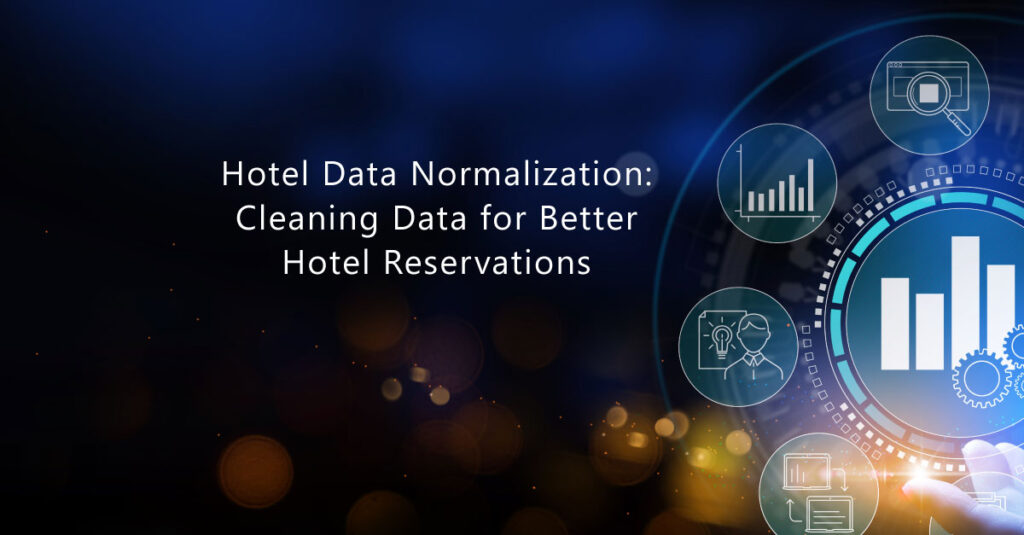
In this big data era, any form of data is a gold mine for decision-makers and data analysts. Data has the power to streamline business operations, transform customer experience and elevate business revenue. According to Statista, by 2029, the big data market is expected to reach over $655 billion. One challenge that travel agencies, travel management companies, or tour operators face is obtaining standardized hotel data and easy-to-read datasets. This can be solved by hotel data normalization. Let’s dive into understanding its importance and how it can increase hotel reservations. Hotel data normalization is the process of organizing hotel data in a database to eliminate data redundancy and make the database more efficient. It is a process to develop clean, deduplicated, and structured data so that the final data is accurate and free of duplicate records. Basically, data normalization eliminates ambiguity and unstructured data around a hotel property information and improves the usability of the hotel data set. Additionally, normalized databases take less disk space and increase overall performance. Hotel data normalization works for hotel name, street address, hotel phone numbers, static room information, hotel property type, country code, and much more. Below is an example of how hotel data normalization works on raw data and ensures the database is decluttered, organized and usable in strategic business decisions. Raw Hotel Data Normalized Data Benefit Supplier 1: Caesar Suites, Las Vegas hotelsSupplier 2: Caesar Suites at Palace Caesars Suites at Caesars Palace, Las Vegas Helps reduce duplicate hotel entries if matching requirements include hotel name 911234569 911-234-569 Prevents wrong dialing and makes dialing easy 2 BR sea view room 2 bedroom with sea view Helps reduce duplicate room entries if matching requirements include room name crescent Rd, Dubai Crescent Road, Dubai Standardized address According to our research, on average, a single hotel gets listed 9 times on an OTA’s platform. Can you imagine the damage it does to customer experience? For example, the luxury hotel resort- Atlantis, The Palm, Dubai can be displayed on an OTA’s platform as Atlantis Resorts, Dubai Dubai, The Palm Atlantis Palm Jumeriah Atlentis, Palm, DXB If you observe, the same hotel is written in different formats or misspelled. The same happens for other hotel attributes such as hotel street address, phone number, room names, location, etc. This leads to duplicate hotel data, Here are 5 benefits of hotel data normalization: Improves database organization After data normalization, the database is organized with high-quality and valuable data. This reduces data management time and helps data analysis quickly. 2. Removes duplicate data records Normalizing hotel data will remove the number of duplicates from your database. This method groups duplicate hotel data into one category, which makes it easy to read and analyze large datasets. 3. Reduces data redundancy Data redundancy is a common data storage issue and reducing data redundancy will speed up the data processing time and the organized database will be regularly updated with the latest hotel content. 4. More storage space Data normalization reduces duplicates and data redundancies which frees up gigabyte and terabyte space. More storage space will result in faster system performance and efficient data analysis. 5. Quick data sorting Normalized database helps travel businesses get answers to simple questions like- “how many bookings did I have in Florida” or “where are my customers traveling to most this month.” Data normalization helps spot patterns or trends that can help you design travel packages or discounts for your customers. Vervotech’s AI-powered Curated Content tool provides high-quality hotel data so that OTAs, TMCs, DMCs, tour operators or any accommodation provider showcase accurate hotel information on their website. Our intelligent AI algorithms scan, identify, and tag accurate hotel data such as detailed hotel addresses, property type, room images, geocodes, star ratings, and much more. Our team of content analysts verify images sent by over 600 suppliers and then delivers high-quality HD hotel and room images. Currently, we deliver highly accurate master room content of more than 100,000 hotels, manually curated and verified by our team of mapping experts. Our goal is to provide normalized hotel data so our clients can easily make strategic business decisions and enhance their customer booking experience. Vervotech is a leading Hotel Mapping and Room Mapping API that leverages the power of AI and ML to quickly and accurately identify each property listing through the verification of multiple parameters. With One of the industry’s best coverage of 98% and an accuracy of 99.999%, Vervotech is quickly becoming the mapping software of choice for all leading global companies operating in the travel and hospitality industry. To learn more about Vervotech and the ways it can enhance your business in the long run contact us: sales@vervotech.com
Maximizing the Benefits of Hotel Business Intelligence
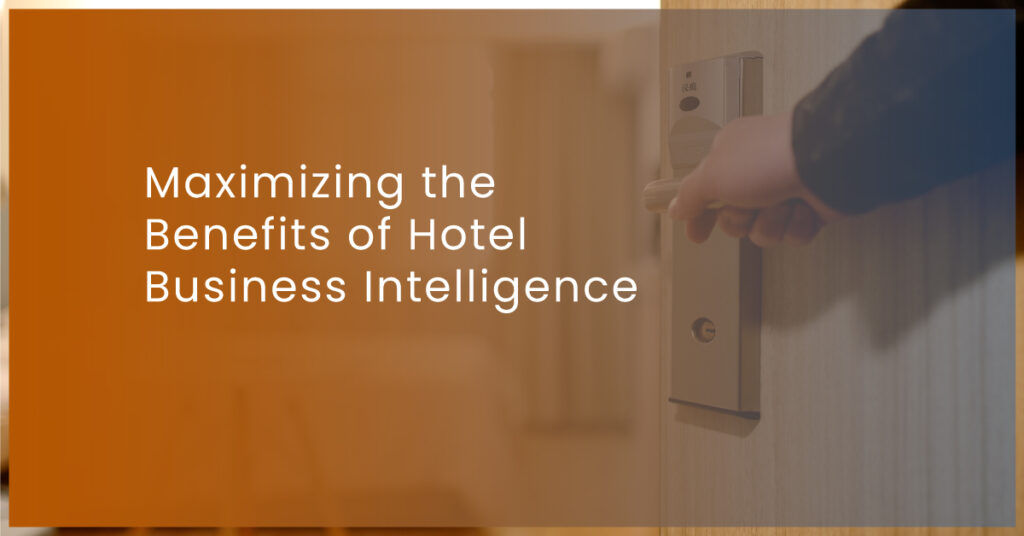
The hotel industry constantly evolves, with new technologies, trends, and competition arising daily in every nook and corner. In order to stay ahead of the game, hoteliers need to be able to make data-driven decisions based on accurate, up-to-date information. It is where hotel business intelligence comes into the picture. Business intelligence, or BI, refers to the use of various technologies, applications, and processes to gather, integrate, analyze, and present data from multiple sources. By utilizing BI, hotels can gain valuable insights into their operations, performance, and market trends, which can help them to improve efficiency, increase revenue, and gain a competitive edge. In this article, we present you a method to approach hotel business intelligence that will help you maximize its benefits. To make it easier for you, we dissect it into three parts, understanding, analysis, and action on business data. Let’s have a look! 1. Understanding the available data The first step in using hotel business intelligence is understanding the data that is available to you. This data can come from a variety of sources, including: Property management systems (PMS) Point-of-sale systems (POS) Booking stats from Customer relationship management (CRM) systems Social media and online review sites Market research and industry reports In order to fully leverage the power of BI, hotels need to be able to integrate data from all of these sources and analyze it in a meaningful way. This requires a solid understanding of the data and the ability to clean and prepare it for analysis. Time and money are your scarcest resources. You want to make sure you’re allocating them to the highest-impact areas. Data reveals impact, and with data, you can bring more science to your decisions.” – Matt Trifiro, CMO, Vapor IO. 2. Finding actionable insights Once you understand the data well, the next step is to analyze it and turn it into actionable insights. This is where the power of BI really comes into play. There are a variety of tools and techniques that can be used to analyze and visualize data, including: Hospitality Reporting and Analytics: It allows hoteliers to see key metrics and performance indicators at a glance and drill down into the data for more detailed analysis. Data mining and modeling: These techniques can help hotels to identify patterns and trends in the data, such as which types of guests are most likely to book a room or which revenue streams are most profitable. Machine learning models: This can be used to predict future trends and patterns, such as how occupancy rates are likely to change in the future or which marketing campaigns are most likely to be successful. 3. Putting data into action The final step is to implement the insights gained from the data and act on them. It includes: Automating tasks and processes: By using data to identify areas where automation can improve efficiency, hotels can save time and money while enhancing the guest experience. Targeted marketing: By using data to segment their customer base and understand their preferences, hotels can create more effective and targeted marketing campaigns that drive more bookings and revenue. Optimizing pricing: By analyzing data on occupancy rates, demand, and competition, hotels can optimize their room pricing to maximize revenue. In this article so far, we have discussed the benefits of using business intelligence (BI) in the hotel industry and the steps that hotels can take to maximize those benefits. While there’s one more step which is equally important that is selecting the right BI tool. With so many options available, it can be difficult to know which tools are the best fit for your hotel. To help you in your search, we have compiled a list of the top five hotel BI tools that we recommend: Oracle Hospitality Reporting and Analytics: This tool allows hotels to collect, integrate, and analyze data from various sources, including property management systems (PMS) and point-of-sale systems (POS). It also offers a variety of customizable reports and dashboards, as well as advanced data mining and modeling capabilities. STR: The STR provides hotels with market data, competitive intelligence and trend analysis, STR’s data helps hotels to benchmark their performance against industry averages, analyze market trends and make informed business decisions. Tableau: Tableau is a powerful data visualization tool that can help hotels to analyze and present data in an intuitive and interactive way. With Tableau, hotels can create interactive dashboards, reports, and visualizations that provide valuable insights into their operations and performance. Duetto: This cloud-based solution allows hotels to analyze and optimize pricing, demand, and revenue. Duetto’s technology allows hotels to identify patterns and trends in their data, and to create dynamic pricing and revenue management strategies to increase bookings and revenue. Rainmaker: Rainmaker’s revenue management system is cloud-based software that enables hotels to optimize pricing and revenue. It also provides forecasting, budgeting, and performance management features to help hotels make better-informed decisions. These are just a few of the many hotels BI tools that are available on the market. It is important to keep in mind that every hotel is unique and has its own set of needs and goals. Therefore, it is important for hotels to evaluate the different BI tools available and determine which one best fits their specific needs. Hotel business intelligence is pivotal for hotel chains and individual hotels looking to improve efficiency, increase revenue, and be on top of the competition’s movements. Hotels can be proactive and continuously improve by understanding and leveraging data, analyzing and visualizing it, and implementing the insights gained from business intelligence tools. The industry is constantly evolving, and BI is a way to keep up, stay ahead in the game, and drive growth with better visibility of business processes. Vervotech is a leading Hotel Mapping and Room Mapping API that leverages the power of AI and ML to quickly and accurately identify each property listing through the verification of multiple parameters. With One of the industry’s best coverage of 98% and an accuracy of 99.999%, Vervotech
Six tips for choosing the right inventory supplier for a travel business
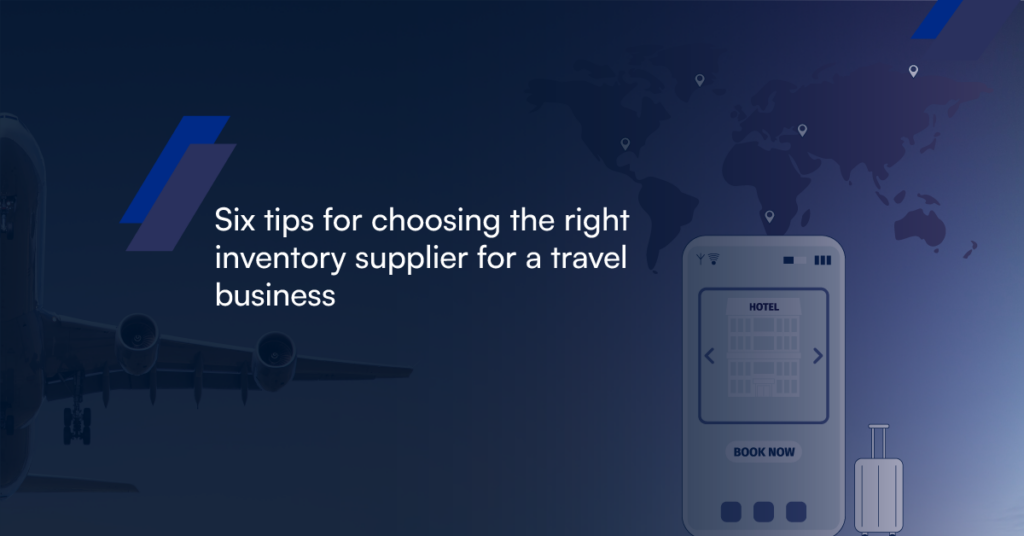
Every business in the travel industry understands how critical it is to have a great partnership with hotel whole sellers. From offering the latest hotel products, rates & inventory, delivering hotel content, and providing travel agents the incentives and upgrades for their customers, suppliers play an essential role in driving the sales of the travel business. But how to select the right hotel supplier to support your travel business? We are here to help you with six tips when choosing your next supplier partner or to evaluate your existing hotel provider. Six tips on how to select the right supplier partner for your business Robust technology Technology is the backbone of any business, bringing better business opportunities and customer experience. While vetting a potential supplier, see how prepared they are to take care of technology needs such as How fast is their API response time? Do they send advance notifications during scheduled downtime? Do they have the ability to scale with your travel business? Do they implement cutting-edge technologies to make their solutions the best for agents? The supplier’s answers to these questions will help you evaluate them better. Support for extranet or direct contracting The next factor to look for while vetting the right hotel supplier is if they are offering support for configuring and using custom rates. Suppliers should offer closed user group rates if you have a member-based travel business, whereas if your business caters to budget travelers, look for suppliers that provide good coverage of cheaper accommodations such as 3-star hotel properties, apartments, hostels, etc. Regional coverage Partnering with regional suppliers can help your travel business grow profoundly. Regional suppliers have a strong foothold in their regions and will provide you with hotel products at competitive prices, generating better sales. Firstly, identify where most of your customers are traveling and choose the right supplier in that region. This strategy will increase customers and sell properties faster. Pricing structure and commissions Another factor in vetting a new supplier is checking their pricing structure. Since the travel market is highly competitive, your business must partner with a supplier that offers you hotels at the best commissions and most affordably priced hotels. If your hotel rates align with what your customers expect, you can have the edge over your competitors and sell more hotel properties at the best rates. Strong operations & fulfillment support Customers are the lifeline for OTAs, and it is essential to partner with a supplier that would offer you excellent customer support. When choosing the right supplier, it is necessary to focus on whether it has robust operations and fulfillment support. When a traveler books a hotel from OTA, the supplier must ensure smooth post-booking confirmation and efficiently handle customer queries, if any. High-quality hotel content Do you know that users check more than 20 hotel attributes before booking a hotel? Hotel inventory is the heart and soul of every travel business. And the right supplier must provide accurate inventory and up-to-date hotel content such as hotel address, geocodes, room images, star ratings, and much more. Why is this an important factor? Well, the hotel content will instill confidence in your customer’s booking decision, build brand loyalty and boost sales too. If you are selling hotel products, then working with the right supplier can significantly impact the customer experience and your business. The six factors mentioned above can help you assess the right hotel supplier that can dramatically take your business to the next level.
Is Bliesure the Future of Business Travel?

Business travelers are returning faster than the industry predicted. Global Rescue reports about 60% of business travelers had at least one multi-day domestic business trip by July 2021. And nearly one-third of those travelers also flew internationally. Still, the complete rebound of business travel is a little too far, and it will take time. At the same time, this emerging trend of Bliesure is pulling loads of employees back on the roads and in the open air again. The mental makeup of the Millenials, the new generation, is a strong reason why Bliesure Travel is taking off. They are not taking vacations – time off from work, which is why they are burning out faster than their older peers. Also, businesses are now gradually understanding – virtual meetings could be an alternative to face-to-face meetings, but they cannot replace them. Personal interaction is still the most effective way to build and maintain professional relationships, nurture trust, and drive your company’s growth. That said, let’s first understand what is Bliesure and what makes it different from conventional business trips. What is Bliesure? Bliesure is an amalgamation of business and leisure, allowing employees to add vacation days to their business trips. It’s basically a business trip with an additional leisure component added. There are two ways to chalk out a Bliesure trip: add leisure days at the start or end of a business trip; it’s good mostly when traveling alone or in a group. Another way for Bliesure is to take friends and family on the trip, where you take time off every day to do leisure activities, and the company fully sponsors it. The Bliesure as a concept is not new; it has been around for some time now. The significant difference is now when the travel industry is recovering from the slump of the pandemic; marketeers are fuelling this term. But it does not anyway limit the potential of Bliesure as a concept. Organizations can use bliesure to attract a good talent pool, offer it as an additional employee benefit, and it can play a significant role in employee retention. How Can Bliesure Transform Business Travel? Apart from the benefit that businesses and organizations can drive from bliesure, bliesure travel opens heaps of growth opportunities for the travel industry. Let’s look at three leading ways the travel industry can take advantage of the Bliesure buzz: 1. The Bliesure Messaging Messaging is essential; you can’t sell what you can’t publicize. So, travel businesses need to create packages for Bliesure and start reaching out to the planners, which are still in the early booking process. Alternatively, travel businesses can directly reach out to business travelers. Start the messaging process by educating travelers about the concept of bliesure. Send educational content, run ads or launch a full-fledged marketing campaign to target business travelers who might be interested in the idea of bliesure. 2. Cost-Effective On-Trip Offerings For business travel, it’s mostly planners, in-house or third agents that make all the booking arrangements. And the agents prefer to book room blocks for sales meetings and conferences to get competitive rates. The business travel planners and agents always try to get maximum travel benefit on corporate rates, and they are very price-conscious. So, you cannot sell them, which goes even slightly above corporate rates. But you can always sell cost-effective on-trip offerings that make your venue more appealing. And convince them how you can make the leisure part more enjoyable for their travelers. 3. Value Addition on Experience Once you are able to convince planners and agents, they will do free marketing for you. While you need to understand the limitations of Bliesure travelers, they can only extend their trip for a few days, not weeks. So, you have very little time to make their Bliesure experience worthwhile. Recommended: Five Emerging Technology Trends in Travel Industry Every four out of five business travelers spend about five hours figuring out – what they can do once they are over with business obligations. That’s where the opportunity lies; you can incorporate athletic activities, water sports, special meals, hiking, and biking into your package. And sync these activities with travelers’ business obligations. Supposedly, they can enjoy these activities if they have a day off during the trip. Else, they already have extra days for the leisure part of their bliesure trip. Make sure you inform the planners of every activity. As mentioned earlier, they will do free marketing for you. Because they also have to justify their choices. The Bliesure might not be a new phenomenon. Still, it has great potential to boost the travel activity in its new avatar when so many Travel and Marketing companies are pushing it in the public eye. And it can potentially become a new norm for business travel.
Why are white label travel solutions crucial for travel startups?
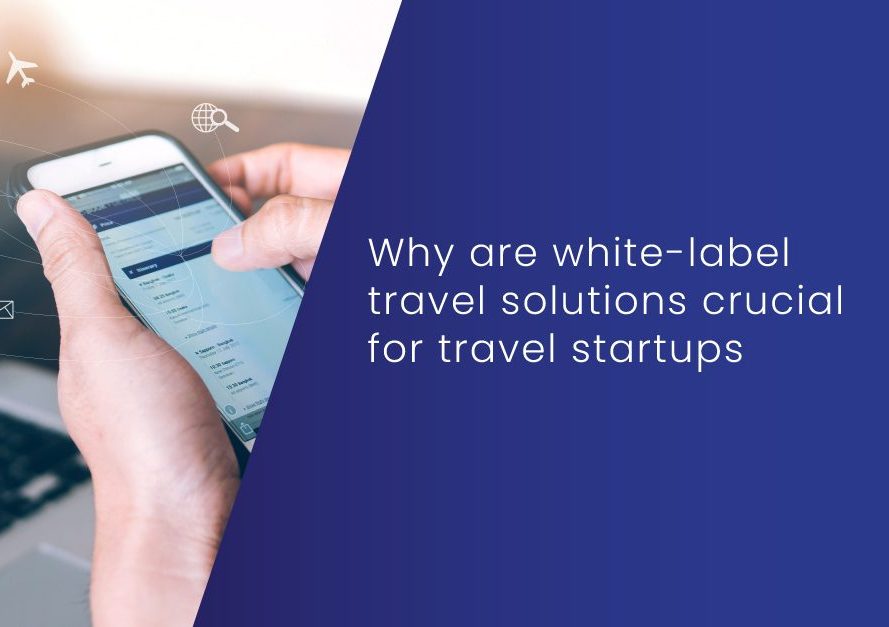
During the initial years, startups have limited financial bandwidth, which they should allocate to their core functions. Travel startups are no different. They need to outsource many tasks to cut costs and provide comprehensive solutions that are competitive in the market. That’s when white-label travel solutions become crucial for travel startups. They offer a quick and cost-effective way to enter the market without investing in expensive technology, partnerships, supplier relationships, and infrastructure. One of the biggest challenges for travel startups is the high cost of building and maintaining a comprehensive travel technology platform. Developing a booking engine, integrating with multiple travel suppliers, and creating a user-friendly website can be a costly and time-consuming process. White-label travel solutions offer a ready-made solution that can be easily customized to the startup’s brand and requirements. These solutions typically include a booking engine, a selection of travel products and services, and a user-friendly website that can be accessed from any device. What’s a white-label travel solution? A white-label travel solution is a travel technology or a feature that is branded and customized for a specific company or organization. It means that a travel startup can use these readymade technologies and features under their own brand name and monetize them. And the company that makes solutions does not leave any branding and allows travel businesses to use their technologies on a subscription basis. Therefore, white labeling allows a travel company to offer their customers a seamless travel booking experience while using the technical infrastructure and expertise of third-party technology players. Benefits of white label travel solutions for startups One of the key benefits of white-label travel solutions for startups is their ability to launch quickly and efficiently. White labeling eventually helps travel startups to save time and money, as they can focus on critical growth functions rather than building a platform from scratch. The extra resources benefit almost all the functions of the business. How? Read on as we explain them one at a time. Improved sales & revenue With an advanced booking portal integrated with all necessary APIs from white label solution provider, you can provide all the features and functionalities to your customers that the leaders in your industry provide. Once you add a decent differentiator, you will witness more visitors completing bookings on your travel portal. Personalization of services As we mentioned earlier in the article, white-label products and services allow your travel brand to personalize services and incorporate tools that cater to the demand of the day. And as you personalize your services, it creates a value differentiator that will immensely help your marketing efforts. Better customer satisfaction & retention rate The white-label travel solutions provide a luxury of choice, and you can offer a variety of options to your customers as you provide the convenience of accessing all the information in one place. A technology use case here could be a conversational AI chatbot linked to your human customer support. This way, you offer your customer a comprehensive support ecosystem with a single third-party integration. It will eventually boost your customer satisfaction ratings and retention numbers. Wider business reach The ability to access a vast array of travel products and services through an API increases your punching power early in your business. You can quickly widen your company’s reach and target a broader client base. For example, if your platform doesn’t have short-term rentals, you can easily plug in a supplier that offers STR. Now, if you worry about inconsistencies in displaying properties, use a hotel mapping tool to reach a wider customer base with clean listings. In addition, white-label travel solutions often come with support and training, enabling travel startups to start using the product and services as quickly as possible and start reaping the benefits, which is virtually impossible if startups build solutions themselves. Recommended: Why do OTAs, DMCs, TMCs, and Hotel Suppliers need Mapping? Final word! Technologies take time to mature, and startups cannot afford to enter a market with half-baked solutions. It dents customer sentiment towards an upcoming brand. That’s why white-label travel solutions are crucial for travel startups as they provide a quick and cost-effective way to enter the market, offering a ready-made solution that can be easily customizable. These solutions can help travel startups launch their business offerings quickly and focus on marketing and customer acquisition, giving them a competitive advantage in a crowded and highly competitive market. Vervotech is a leading Hotel Mapping and Room Mapping API that leverages the power of AI and ML to quickly and accurately identify each property listing through the verification of multiple parameters. With one of the industry’s best coverage of 98% and an accuracy of 99.999%, Vervotech is quickly becoming the mapping software of choice for all leading global companies operating in the travel and hospitality industry. To learn more about Vervotech and the ways it can enhance your business in the long run contact us: sales@vervotech.com
Why do OTAs, DMCs, TMCs, and Hotel Suppliers need Mapping?
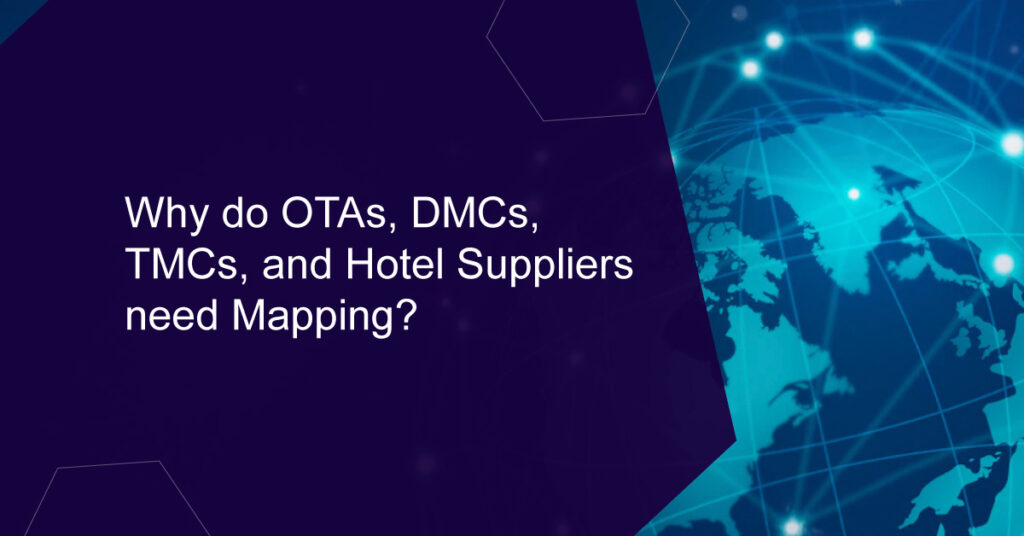
Hotel Mapping is a process of curating hotel content data coming from various suppliers by merging property IDs and creating one unified ID to avoid duplicate and inconsistent listings. Mapping (both hotel and room) empowers travel businesses to display relevant hotel and room attributes with about 100 percent accuracy, which prepares the ground for high conversion numbers and positive customer ratings. Also, it nullifies potential losses due to duplicate listings of hotels and rooms. The necessity of mapping for OTAs, DMCs, TMCs, and Hotel Suppliers All travel businesses sourcing hotel and room data from multiple sources need mapping to ensure the data they are putting out is correct, unique, and caters to the intent of their potential customers. However, there is a set of travel businesses; for them, mapping is not a subordinate exercise but a compelling necessity. Here, in this article, we break down the need for mapping for those travel players. Online travel agencies (OTAs) As per Phocuswright’s research about 51% of hotel bookings are made through OTAs. Not just accommodations, but OTAs are also the largest distributors of other travel products like flights, cruises, and transfers. They have a massive flow of third-party data to deal with, which is also true for hotel suppliers. OTAs source hotel and room content from multiple suppliers, and this data is extremely crude. Often has numerous duplicates of the same hotel and room content, missed addresses, incorrect geolocations, and missing essential amenities. Inaccuracy or absence of any of these attributes leads to massive losses. Therefore, OTAs need automated mapping tools that sensitize their hotel and room content in real-time. Destinational management companies (DMCs) Destination management companies mostly have directly contracted hotels coming from multiple suppliers, which often have duplicates leading to duplicate bookings or overselling. That is why they need solid mapping to ensure their inventory is unique and their customers do not end up booking the same property twice. And, if they want to widen their horizons, go global, or partner with other players at specific rates, they need mapping because they might have cracked the rate deal. Still, if they are not accurately mapped, if there’s inconsistency on either side, they might have to suffer huge losses. And the reconciliation becomes even more cumbersome due to the unavailability of data. Travel management Companies (TMCs) The OTA (Online Travel Agency) use case we previously mentioned is valid for TMCs as well. Apart from that, TMCs work on pre-paid models with suppliers and raise invoices at the end of every month. The identification of hotels must be the same for both TMCs and suppliers. At times, TMCs book hotels, and by the time check-in happens, hotels shut down or not be in operation. Now, TMCs have no solid way to prove such a hotel did exist at one point in time. If TMCs have their hotel data mapped, they can persistently keep a record of each booking. That is why mapping becomes a necessity for TMCs both for operations and reconciliations. Corporate travel management companies manage corporate travel portals for large corporates. They source data from GDSs (Global Distribution System), and data availability is terrible for them. Especially the data coming back to them, which most employees submit through invoices. For e.g., An Invoice has a hotel name city name, and the city has multiple hotels from the same name, say, Hyatt, Dubai. Now CTMs have no way to know which hotel was booked. To aggregate the data, run analytics, and raise invoices, CTMs strictly need a mapping solution to know which travel product was booked, where, and when. Hotel Suppliers Hotel suppliers have so many aggregation sources. They source hotels from other suppliers and channel managers and have directly contracted hotels. Quite often, they also source hotels directly from hotel chains. Due to multi-channel sourcing, the odds of getting duplicate content go significantly higher. That is when they need mapping to deduplicate and refine content and be able to sell unique hotels at competitive rates. Recommended: Top Hotel Mapping Tools in 2023 To conclude, mapping tools help all the travel players mentioned above accurately deliver travel products, facilitate easy settlements, and maximize profits by using the full inventory capacity.


